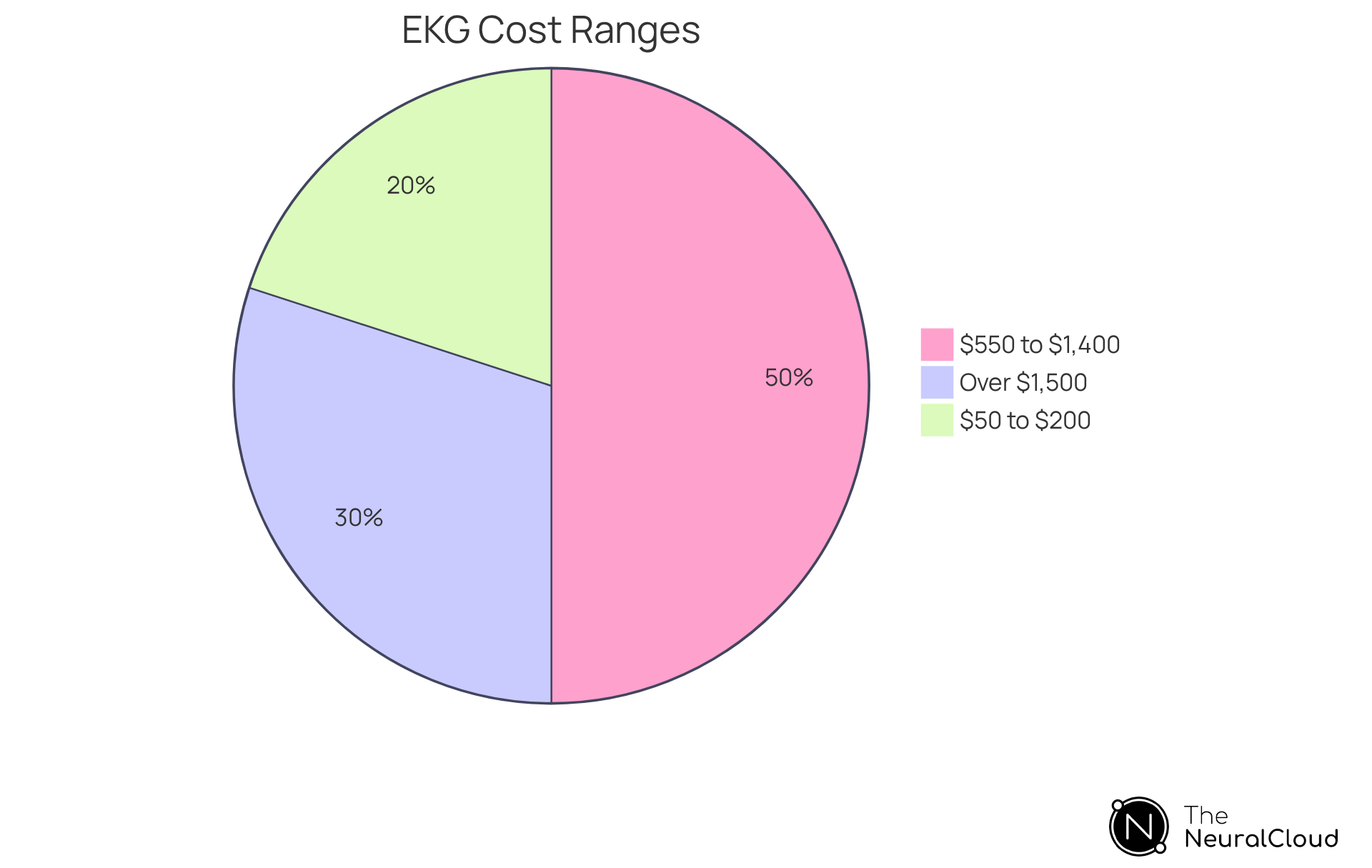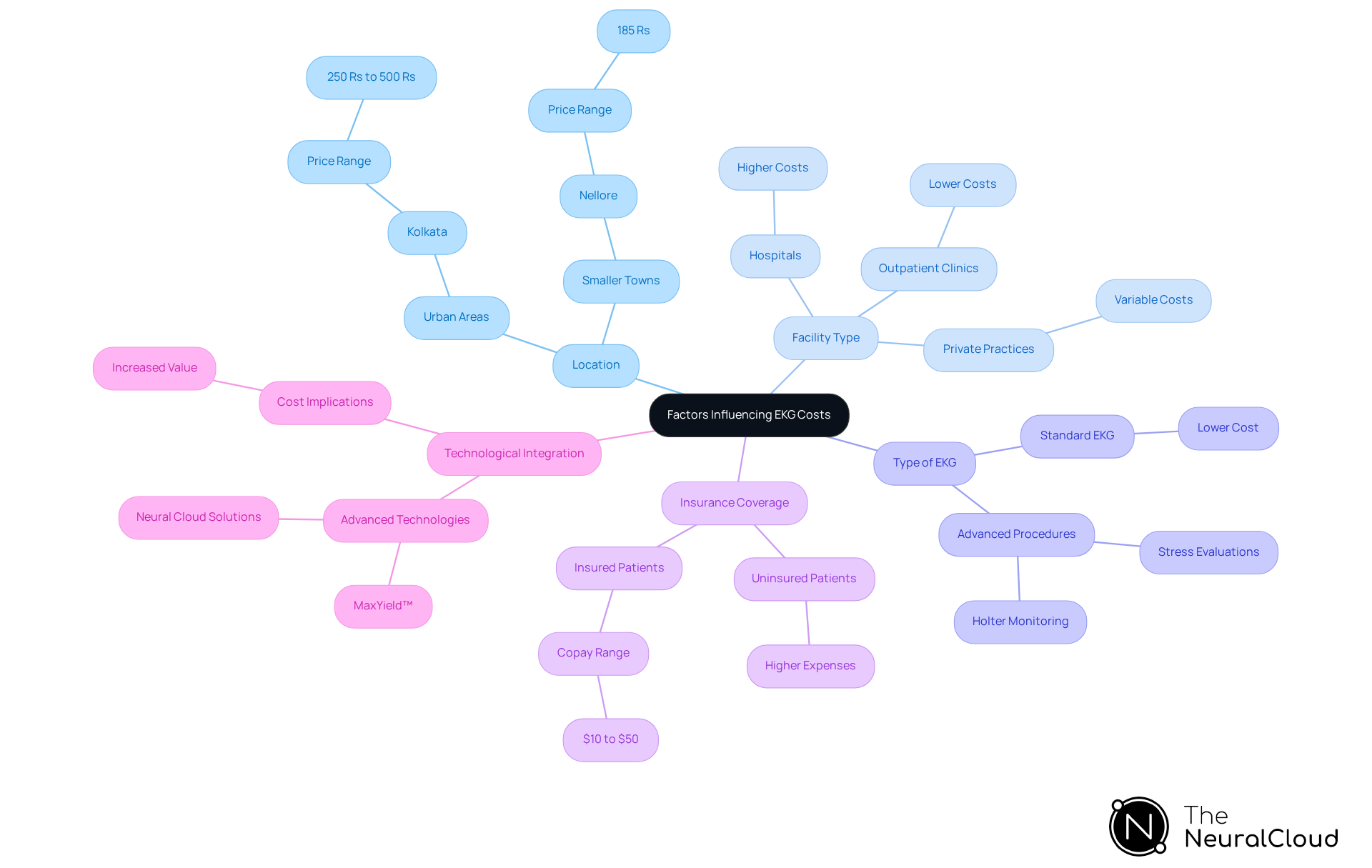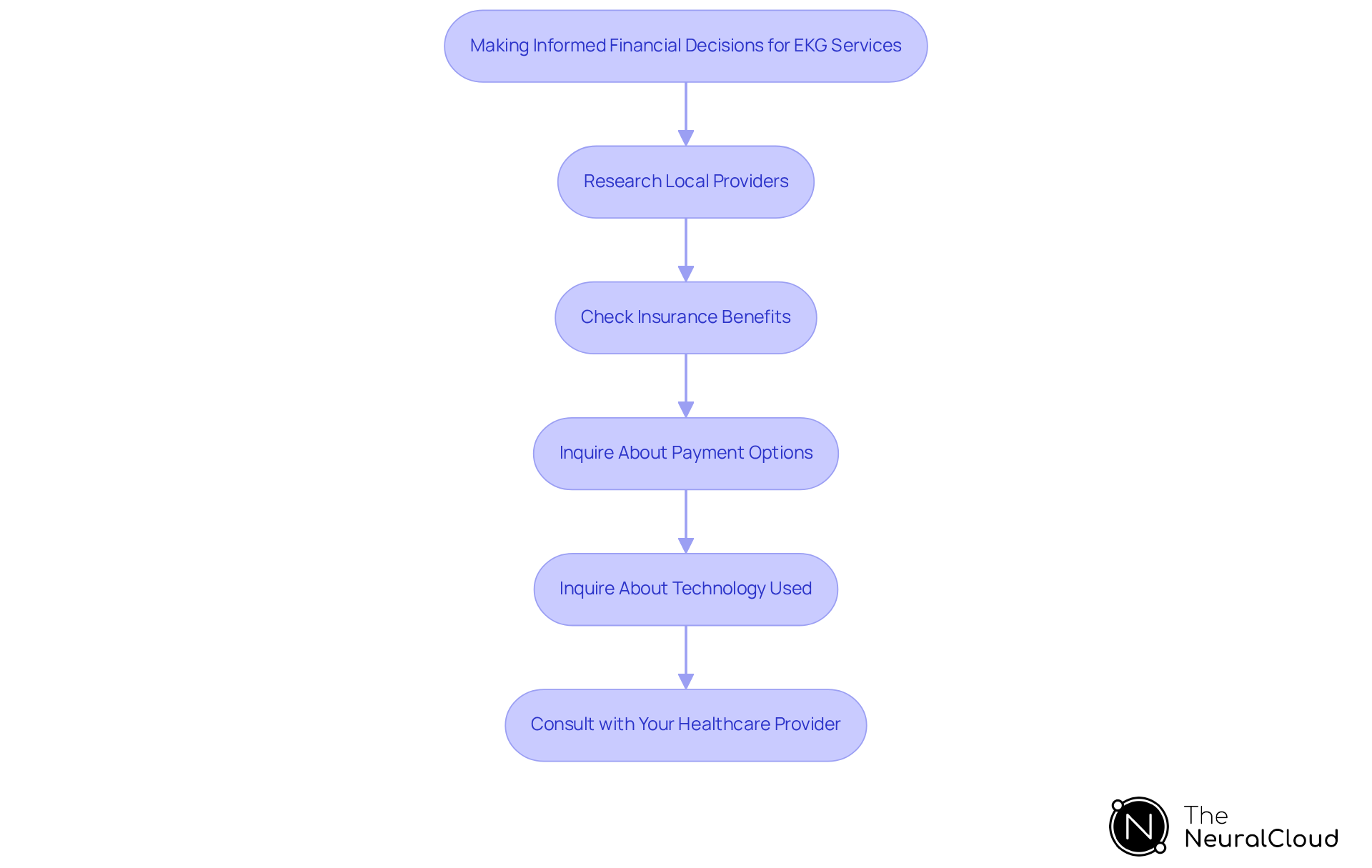Overview
The cost of an EKG generally falls between $50 and $200. However, this price can rise to $500 or more due to various factors, including location, type of facility, and whether the EKG is part of a broader cardiac evaluation. Urban hospitals, for instance, often impose significantly higher charges compared to outpatient clinics.
Understanding these costs is crucial for making informed financial decisions regarding EKG services. By comparing prices and being aware of insurance coverage, patients can better navigate their options. This knowledge not only helps in budgeting for healthcare expenses but also empowers individuals to seek the most cost-effective solutions for their cardiac assessments.
Introduction
The cost of an EKG test can vary significantly, influenced by factors such as location, facility type, and insurance coverage. Prices can range from as low as $50 to over $1,500, depending on these elements. Understanding the nuances of EKG pricing is essential for patients seeking cardiac assessments.
With such discrepancies, how can individuals ensure they are making informed financial decisions regarding their heart health? This guide explores the key factors affecting EKG costs and offers actionable insights to help navigate this complex landscape.
Identify the Price Range for EKG Tests
The cost of an EKG examination, or how much does an EKG cost, can vary significantly based on several factors, including location, type of facility, and whether the procedure takes place in a hospital or an outpatient setting. In 2025, how much does an EKG cost generally fall within the price range of $50 to $200? However, when evaluating how much does an EKG cost as part of a more comprehensive cardiac assessment, costs can escalate to $500 or more. For example, in urban areas, patients may encounter typical expenses around $1,500, while rural locations often offer much lower rates, sometimes as low as $200, leading to the question of how much does an EKG cost. To understand urban pricing, it's important to note that how much does an EKG cost typically ranges from $550 to $1,400.
When considering EKG procedures, many people ask how much does an EKG cost at hospitals compared to outpatient centers. Some patients report that how much does an EKG cost can be two to ten times greater at hospitals than at urgent care facilities. For instance, when considering how much does an EKG cost, a Routine 12 Lead EKG with a report might be priced at approximately $178 at an outpatient facility, while the negotiated rate for the same procedure at a local hospital can soar to $1,420. This significant difference in pricing highlights the necessity of exploring various options, including how much does an EKG cost.
To effectively manage these costs, it is crucial for patients to consult with local healthcare providers for specific pricing details, including how much does an EKG cost, as they may receive multiple invoices for a single cardiac examination at a nearby hospital. Understanding how much does an EKG cost and how their insurance coverage affects out-of-pocket expenses is also vital. By comparing prices across different facilities, patients can make informed decisions regarding how much does an EKG cost and potentially save considerable amounts on EKG procedures. For instance, patients have reported savings of $1,100 by choosing Trinity Heart and Vascular Group over a local hospital for the exercise stress echo examination.

Explore Factors Influencing EKG Costs
The cost of EKG tests is influenced by several key factors:
-
Location: Prices can vary significantly based on geographic location. For example, urban regions frequently experience elevated expenses due to heightened demand and operational outlays. In cities such as Kolkata, the typical price of an ECG examination varies from 250 Rs to 500 Rs, whereas in smaller towns like Nellore, it can be as low as 185 Rs.
-
Facility Type: The kind of establishment performing the assessment plays a crucial role in pricing. Hospitals generally charge more than outpatient clinics or private practices. This discrepancy can be attributed to the higher overhead costs associated with hospital operations.
-
Type of EKG: The specific kind of EKG examination also influences pricing. Standard EKGs are generally less costly than more advanced procedures, such as Holter monitoring or stress evaluations, which necessitate additional resources and technology.
-
Insurance Coverage: Individuals with insurance might encounter reduced personal expenses, depending on their plan's coverage for diagnostic evaluations. Insured individuals often pay a copay ranging from $10 to $50 for EKG tests, while uninsured patients may face significantly higher expenses.
-
Technological Integration: Facilities that utilize advanced technologies, such as those provided by Neural Cloud Solutions, may have different pricing structures. The incorporation of creative platforms such as MaxYield™ improves workflow efficiency via automated ECG labeling and data extraction, which can result in savings. By optimizing procedures and enhancing diagnostic abilities, these technologies validate increased expenses because of the additional value they offer regarding precision and clinical decision-making.
Understanding these elements can assist patients in predicting how much does an EKG cost and making knowledgeable choices about their healthcare alternatives.

Make Informed Financial Decisions for EKG Services
To make informed financial decisions regarding EKG services, consider the following steps:
-
Research Local Providers: Compare prices from different facilities in your area, as expenses can vary significantly. When considering how much does a ekg cost, EKG examinations typically range from $15 to $30, while charges without insurance can differ from $50 to $200 based on the provider.
-
Check Insurance Benefits: Review your insurance policy to understand coverage for EKG tests, including any co-pays, which generally range from $10 to $50. Most insurance plans cover EKGs performed at urgent care clinics, so it's important to check how much does a ekg cost, as coverage may vary.
-
Inquire About Payment Options: Some facilities provide payment plans or financial aid for individuals without insurance, making it easier to handle expenses. For instance, Dr. Sophia Rahman's clinic offers flexible payment options to enhance accessibility.
-
Inquire About Technology Used: Facilities utilizing advanced technologies, such as the MaxYield™ platform, may provide more accurate results, potentially justifying increased expenses. This technology enhances the clarity of ECG signals, which can be crucial for accurate diagnoses.
-
Consult with Your Healthcare Provider: Discuss the necessity of the EKG test with your doctor to ensure it aligns with your health needs and financial situation. Understanding the medical necessity can help you navigate insurance coverage and out-of-pocket costs effectively.

Conclusion
The financial landscape surrounding EKG tests is intricate, with costs shaped by various factors such as location, facility type, and insurance coverage. Understanding the cost of an EKG is crucial for patients seeking cardiac assessments, as prices can vary significantly—from as low as $50 to over $1,500—depending on the setting and specific circumstances. By exploring different healthcare options and comparing prices, individuals can make informed decisions that align with their health needs and financial situations.
Key insights indicate that:
- Urban areas typically have higher prices due to increased demand and operational costs.
- Outpatient facilities often offer more affordable rates than hospitals.
- Insurance coverage plays a vital role in determining out-of-pocket expenses, with insured patients generally facing lower costs.
- Technological advancements in EKG testing can also influence pricing, as facilities that invest in modern solutions may provide enhanced diagnostic capabilities that justify higher fees.
Ultimately, taking proactive steps to research local providers, understand insurance benefits, and consult with healthcare professionals can lead to significant savings on EKG procedures. By prioritizing financial awareness and exploring available resources, patients can navigate the complexities of EKG costs and ensure they receive the necessary care without undue financial burden.
Frequently Asked Questions
What is the general price range for EKG tests in 2025?
The general price range for EKG tests in 2025 typically falls between $50 to $200.
How do the costs of EKG tests vary based on location?
Costs can vary significantly based on location, with urban areas often having higher expenses around $1,500, while rural locations may offer much lower rates, sometimes as low as $200.
What is the cost of an EKG as part of a comprehensive cardiac assessment?
When part of a comprehensive cardiac assessment, the costs can escalate to $500 or more.
How do EKG costs at hospitals compare to those at outpatient centers?
EKG costs at hospitals can be two to ten times greater than at outpatient centers. For example, a Routine 12 Lead EKG with a report may cost approximately $178 at an outpatient facility, while the same procedure at a hospital can be around $1,420.
Why is it important for patients to consult with local healthcare providers regarding EKG costs?
It is crucial for patients to consult with local healthcare providers for specific pricing details, as they may receive multiple invoices for a single cardiac examination and need to understand how their insurance coverage affects out-of-pocket expenses.
How can patients save on EKG procedures?
By comparing prices across different facilities, patients can make informed decisions and potentially save significant amounts, such as the reported savings of $1,100 by choosing a different provider over a local hospital.






